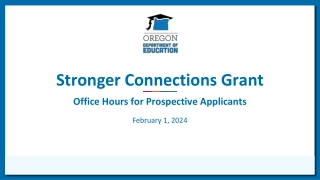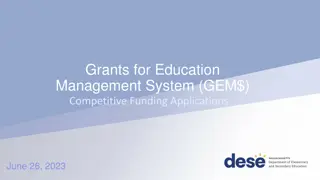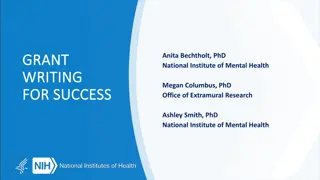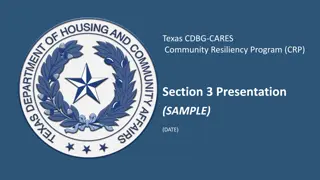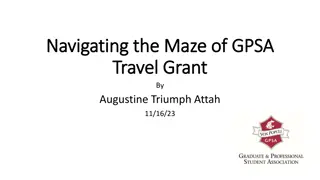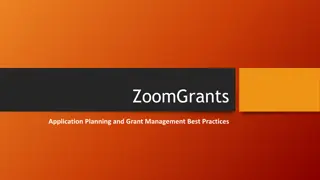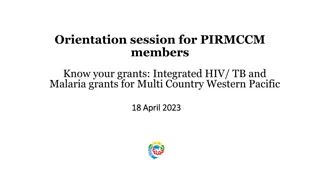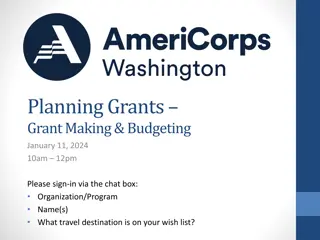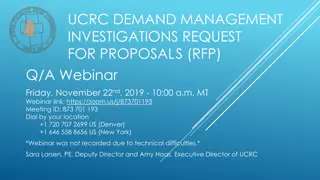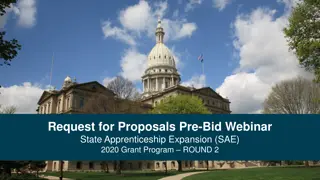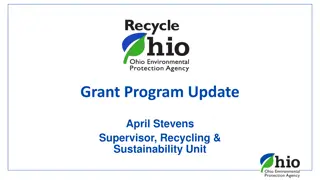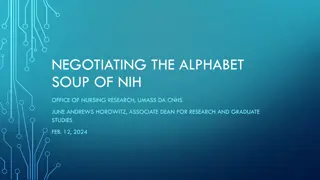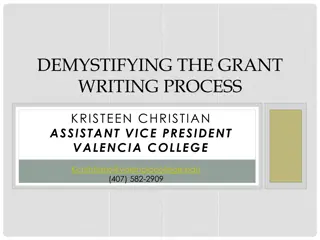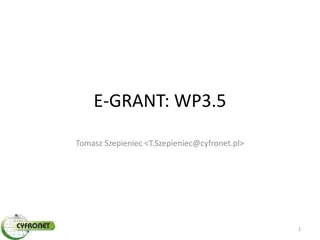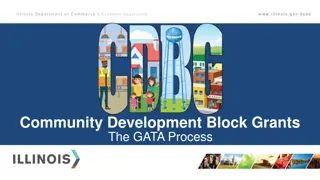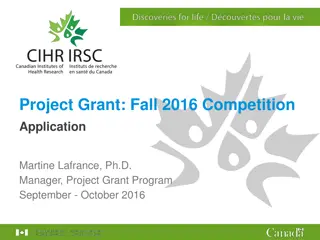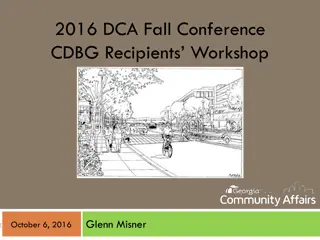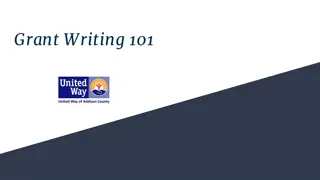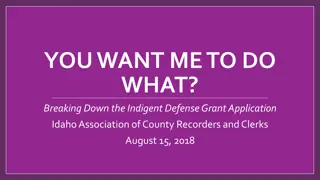Managing Your Grant - Key Information for Success
Gain insights and key information on managing your grant effectively, covering important fiscal dates, grant requirements, roles and responsibilities, expectations, and fiscal reviews. Ensure compliance and successful implementation of your grant for optimum results.
Download Presentation

Please find below an Image/Link to download the presentation.
The content on the website is provided AS IS for your information and personal use only. It may not be sold, licensed, or shared on other websites without obtaining consent from the author.If you encounter any issues during the download, it is possible that the publisher has removed the file from their server.
You are allowed to download the files provided on this website for personal or commercial use, subject to the condition that they are used lawfully. All files are the property of their respective owners.
The content on the website is provided AS IS for your information and personal use only. It may not be sold, licensed, or shared on other websites without obtaining consent from the author.
E N D
Presentation Transcript
Managing your Grant September 2017
Welcome Overview of the Day - Sign in sheet - Certificates Introduction of Presenters - Lois M. Sunderland - Kim Zwayer & Sharon Wiles - Denise R. Wiethe
Who Do I Contact & When Ohio Department of Education Contacts 21st Century Program Office of Grants Management
Important FY18 Fiscal Dates June 30 End of Fiscal Year Feb. April 2018 Grant Continuation Plan (Budget Narrative) Due Dec. 18 CAPA & 1st YR Fiscal Docs Due Oct 6 FY17 Grant Closeout Docs Due Sept. 30 FY17 FER Due
Grant Requirements Fiscal Reviews - Expectations Understanding CCIP - Accessibility/Role - History Log Comment - Status Changes
Roles/Responsibilities Ensure that expenses are for purposes of approved grant application funds on the CCIP budget and budget narrative.
Status Changes Important Note***
Expectations Gain knowledge of 21st Century Appropriate Use of Funds Track the expenditures by object code using USAS coding
Expectations Follow the grant s assurances Attend 21st CCLC mandatory annual Summit Approve grant budgets and revisions Submit Project Cash Requests (PCRs) and Final Expenditure Report (FER).
Expectations Follow 21st CCLC Word Press blog Reach out to other treasurers and ODE to resolve issues and concerns Review most recent approved CCIP budget
Fiscal Reviews First Year Implementation Phase Compliance Fiscal Reviews GRANT CLOSEOUT (Year 2 & 4) FISCAL REVIEW
Basics to Prepare for External Monitoring
Department External Monitoring Audit Checklist Trending Statewide Auditor of State (AOS) Findings Department Subrecipient Monitoring Findings Hot Topics
Checklist Have proper support documentation Financial Reports Know your due dates Upload your support documentation Be available during the review
Examples of Expenditure Support Documentation: Purchase Orders Cancelled Checks Invoices Signed Contracts Semi-Annual Certs/T&E
Examples of Preferred Reports State Accounting Software Detail Transaction Level Inventory Master List
Trending Statewide Auditor of State (AOS) Findings: Over 800 audits reviewed Over 90 Issues and Corrective Actions Top 5 AOS Findings
Department Subrecipient Monitoring (SRM) Findings 103 Entities selected for review 123 Issues/Caps issued Top 5 SRM Issues
Hot Topics Internal Controls / Polices and Procedures Cash Management Procurement /Suspension & Debarment Activities allowed/not allowed Accurate reporting to the Department
Project Cash Request What is a Project Cash Request Submission Process Tips
Project Cash Requests Multiple PCRs and advances can be requested in same month. Cash Management 5 Business Days Immediate cash needs Invoice in hand or will be received and paid within 5 business days Upcoming payroll Support Documentation (may attach summary report to PCR
Grant Requirements Period of Availability substantially approved date to grant ending date Substantially Approve Date determines the date that funds can be obligated Do not obligate prior to budget revision
Budget Revisions Budget revision changes are not retroactive to your original substantially approved date. Grantees can begin obligating expenses in accordance with the revised budget once it is submitted in substantially approvable form. Changes equal to more than 10% of the budgeted cell.
Final Expenditure Report What is a Final Expenditure Report Submission Process 21st Century - No Carryover Provision
Final Expenditure Report Due via CCIP on or by Sept 30th (90 days after the project ending date) Must reflect actual expenditures No encumbrances
Overview Uniform School Accounting System (USAS) Regulations Not Mandatory 2 CFR 200 34 CFR (EDGAR)
What are indirect costs? Costs that have been incurred for common or joint purposes. Costs that benefit the entire organization, and cannot be specifically identified to one cost objective. Utilizing an approved indirect rate allows an entity to charge each Federal grant for its fair share of indirect costs.
Purpose To recover costs associated with typical indirect expenses such as: Fiscal Services (i.e., Treasurer) Executive Services (i.e.,Superintendent) Business Services (i.e., Human resources) Operations and maintenance of plant services Other administrative and business support offices.
Classification of Costs (2) Indirect USAS FUNCTION DESCRIPTION 2400Support Services Administration 2500Fiscal Services 2600Support Services Business 2700Operation & Maintenance of Plant 2900Support Services Central
Budgeting/Recover Indirect Costs 1 If approved ICR budget in indirect cost field. ICR + Governance/Admin. (G&A) cannot exceed 15%. If rate not negotiated with ODE, no indirect costs are allowed. Only direct costs charged to grant are allowed in G&A - object 800 2 Record indirect cost recovery using object 899 in function 2590. 3
Cognizant Agency Determination Designated as cognizant agency for indirect cost negotiation and approval of rate Agency that awards the largest dollar amount of Federal Awards
Coding Issues Receipt Codes Function Codes Object Codes
Join the Conversation OHEducation @OHEducation @OHEducationSupt OHEducation OhioEdDept education.ohio.gov/text







